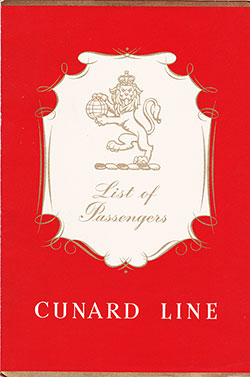Ship Passenger Lists - 1956
Passenger lists for 1956 represent the souvenir list provided to the passengers of each cabin class (and other classes). Many of these souvenir passenger lists have disappeared over the years. Our collection primarily covers North American and European ports and ports in Australia and South Africa.
Our collection contains samples of passenger lists produced and printed by the steamship lines. These lists are often used to illustrate family history books for immigrants from this period.
Coveted by collectors and genealogists, souvenir passenger lists often offered beautiful graphical covers and information not found in official manifests because they focused on the journey rather than the destination.

1956-07-11 RMS Ivernia Passenger List
- Steamship Line: Cunard Line
- Class of Passengers: Tourist Class
- Date of Departure: 11 July 1956
- Route: Liverpool to Montreal via Quebec
- Commander: Captain J. W. Caunce, R.D., R.N.R.

1956-09-18 RMS Mauretania Passenger List
- Steamship Line: Cunard Line
- Class of Passengers: First Class
- Date of Departure: 18 September 1956
- Route: Southampton to New York via Le Havre and Cobh
- Commander: Captain C. S. WILLIAMS
Please help us make our passenger list collection more complete. We would appreciate a digital copy if you have an 1956 souvenir passenger list. Please email us at history@ggarchives.com.
Recap and Summary of Ship Passenger Lists – 1956
Overview
The ship passenger lists for 1956 reflect a maritime industry that was adapting to the increasing dominance of air travel. While ocean liners remained an essential mode of transatlantic and global transportation, airlines were beginning to challenge their position. Many of the voyages documented in this collection were still heavily used for migration, particularly between Europe and North America, as well as for luxury travel.
The passenger lists from 1956 were often beautifully designed souvenirs that provided insight into the shipboard experience, including travel class distinctions and ports of call. These documents are valuable to historians and genealogists as they offer details that are often missing from official immigration records.
Key Voyages of 1956
- RMS Ivernia (July 11, 1956)
- Route: Liverpool to Montreal via Quebec
- Commander: Captain J. W. Caunce, R.D., R.N.R.
- Notable Aspects: This voyage was a part of Cunard’s expanding service to Canada. With post-war immigration to Canada increasing, Cunard introduced the Ivernia as a vessel that catered to budget-conscious travelers. The ship, launched in 1954, was designed to provide comfortable tourist-class travel while accommodating a significant number of passengers emigrating from Europe to North America.
- RMS Mauretania (September 18, 1956)
- Route: Southampton to New York via Le Havre and Cobh
- Commander: Captain C. S. Williams
- Notable Aspects: The Mauretania (1950), the second Cunard liner to bear this name, was a symbol of the mid-century transatlantic experience. This voyage highlights the continued relevance of ships in an era when aviation was gaining traction as the preferred method of long-distance travel.
Significance of 1956 in Ocean Liner and Migration Trends
- Increasing Competition from Air Travel: The rise of jet-age air travel was beginning to impact passenger ship traffic. While airlines had not yet fully overtaken ocean liners in transatlantic travel, more travelers were opting for faster, more convenient air travel, especially for business and high-income leisure trips.
- Expansion of Canadian Immigration: The route from Liverpool to Montreal via Quebec underscores Canada’s continued appeal as a destination for European immigrants. Many British, Irish, and European migrants traveled this route to establish new lives in Canada, particularly due to post-war reconstruction and economic opportunities.
- Decline of Transatlantic Voyages for Migration: By this time, ocean liners were shifting more towards leisure and tourism, though migration still played a significant role. The introduction of more tourist-class accommodations aboard major liners like the Ivernia reflected this shift.
Conclusion
The passenger lists of 1956 document a maritime industry that was at a crossroads. While ocean liners remained a popular method of travel, their dominance was being challenged by advancements in aviation. Cunard, a leader in transatlantic crossings, continued to provide services for both migrants and tourists, with the Ivernia catering to the growing number of immigrants traveling to Canada and the Mauretania maintaining the traditional transatlantic route. These voyages represent the last strong decade of passenger liner travel before jets would completely revolutionize global transportation.
